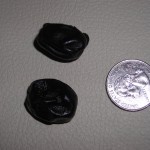
As you may have seen in a previous post, Green Deane, of www.eattheweeds.com offers foraging classes all across Florida. Since I grew up eating the weeds of West Virginia, attending his class wasn’t much of a jump to me, though some of the plants were alien to me at best, at least as far as edibility goes. Knowing I had a serious gap in my knowledge of edible plants, particularly those of Florida, I decided his class was a “MUST have” on my prepper list.
Friendly and humorous, Deane offers insight into text-book examples, as well as real-world usefulness of the local plants in a manner that doesn’t overwhelm you. Much. The class is $30, or $35 if paying via paypal, and after I was done with the class, I’m positive I ate at least $15 in fruits and wild edibles, had I bought them at Whole Foods. This also assumes they would even be available and worth eating. And as far as quality of wild edibles vs. store bought, Deane put it best when speaking about purslane, “I’ve eaten cultivated versions, and the wild ones just taste better”. (I was very happy with the wild version I had the opportunity to taste – I picked a sample to bring home to grow!)
I won’t go into many plant details, as I wouldn’t do his class justice. I wills state that not only is his class worthwhile, I’d suggest it wholeheartedly to anyone interested in eating a better salad that what they buy at the store, anyone looking to improve their diet, or those folks that are not afraid to know where their foods originates.
The class covered everything that Deane knew of a story or use for, either edible or otherwise. Along with a multitude of edible plants, we touched on plants that offered a pitch for sealing, fiber for cordage, and one that even acted as a stunning agent for fish when crushed and spread across a body of water.
As a special note, I had mentioned to Deane about my interest in tasting palmetto berries, something he mentioned here:
and here:
http://www.eattheweeds.com/saw-palmetto-saga-3/

….and Deane was kind enough to bring some he had dehydrated in order to store them. I ended up eating three. The initial taste is almost exactly like a strong blue cheese…the rest I will leave for you to experience. I did manage to snag a couple extras for future use. I will admit that I will be dehydrating some myself this summer.
He pulled no punches, and was very candid about his every day use of wild edibles. However, while I enjoyed the content and delivery very much, I must add that Deane admitted that most edibles should be considered as supplementary to a diet of fish/animal/bird protein of some sort for long term. He is a realist in the usage of what he teaches, and actually has guidelines for plants, listing each as a net gain or a net loss for energy of each plant he covered. For a survival situation, this information is invaluable. And his website today, after 2pm, SHOULD mention the seven wild edibles in Florida that are a net energy gain, and should be learned, just in case.
I was VERY pleased with the class, and am looking forward to interacting with Deane again. Until then, I (as well as you) can follow him at www.eattheweeds.com as well as watching his YouTube videos here
And if you ARE interested, let me know, I’d be more than happy to arrange get him back into the Treasure Coast area for a “private session”, as long as we can manage to gather 5 or more participants. I personally plan on attending as many of his classes as possible – training with a local professional is the method used by our ancestors to learn this knowledge, and Deane’s is a working knowledge, something you cannot learn from a textbook.
db
I think I have three Saw Palmettos in my front yard, but I have never seen them fruit. I really want to try it.
I have two dehydrated berries left over, shall I bring you one? I’ll have to watch you eat it though. Most of the class was repulsed by them.
I’ve eaten Saw Palmetto berries many times and I’m actually sort of fond of them. In my survival classes when the berries are ripe I let students sample them and there’s almost always more nays than yeas on the taste and occasionally someone will comment: “not bad”. I’ve yet to hear a ” yummy” from anyone but they are a great source of survival food.
Ridgerunner